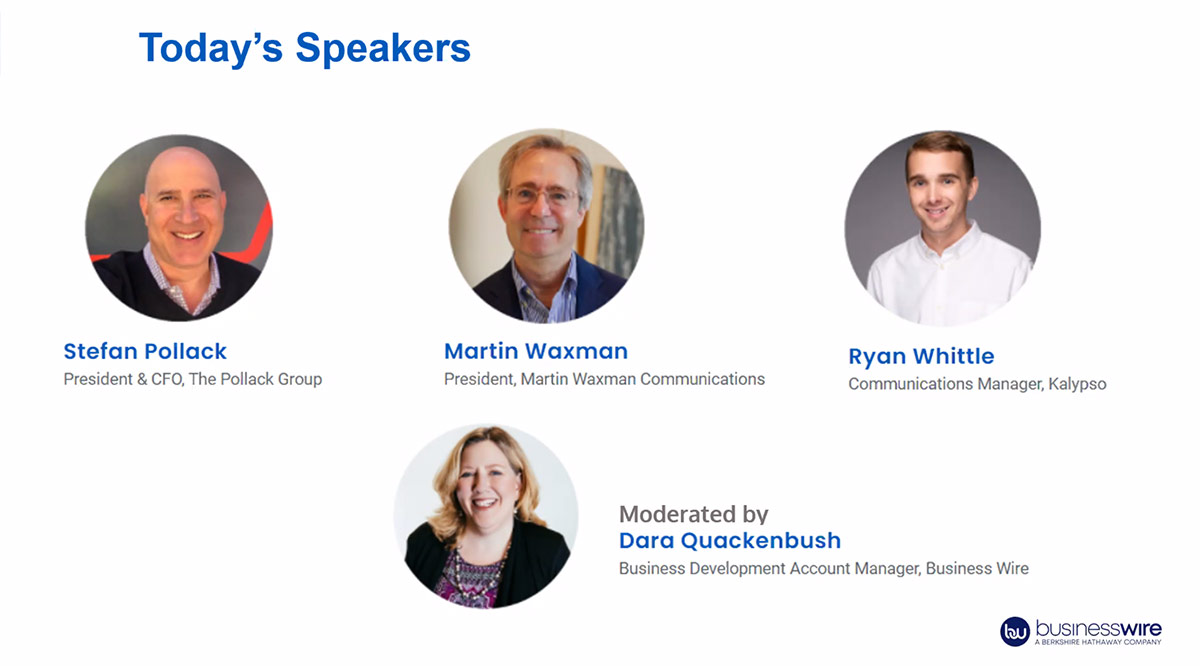By Eloise Monnin
Over the past year, public relations agencies and businesses around the world have had to transition to a complete virtual environment. This change has left many young professionals wondering about the impact it will have on their careers, and what they can be doing to continue growing in the industry.
A recent webinar hosted by Business Wire titled “PR 102: Leveling Up Your PR Game” drew on the experiences and expertise of three panelists, including agency president Stefan Pollack, to address questions currently circulating among young PR professionals. Pollack was joined by Martin Waxman, President at Martin Waxman Communications, and Ryan Whittle, Communications Manager at Kalypso. The conversation was moderated by Dara Quackenbush, Business Development Account Manager at Business Wire. Click here or on the image immediately below to view the full webinar.
The panel has also been condensed into a downloadable whitepaper that can be downloaded here.

Here are some key questions and answers from the conversation:
What is the first thing a young professional should know?
Whether at an agency or in-house, being in PR means being a client service professional. It is important to remember: your boss’ success and the client’s success are also your success.
“Remember to be the leader behind the leader,” Whittle said. “It is crucial to be a trusted advisor to your client and to your boss by continually being credible, reliable, and candid.” His final point on the matter was to ‘always have a really strong point of view’ based on information you have coupled with reliable support.
Beyond entry-level, what does the next level of growth look like?
After about one to four years in the industry, many young professionals will start to ask themselves the age-old question: When will I reach the light at the end of the tunnel? According to Pollack: “if you are looking for the light at the end of the tunnel, keep looking.” He cautioned against this idea because in some cases, the proverbial ‘light at the end’ can actually signify the end of one’s career in a chosen field.
Instead, Pollack suggests looking at every step in your career as a transition point.
In the first two years of your career, “you need to be a sponge” to soak up as much information and industry knowledge as possible. “You need to be able to figure out what you are really good at and where you can excel,” Pollack added.
READ MORE: Agency Panel Recap: Careers Across The Nation
After three to four years comes the point where professionals start to self-assess and re-assess. “That’s where you’ve got to up your game. At this point, you have to be indispensable,” Pollack said.
What changes has COVID brought that young professionals should be aware of?
“Become comfortable in front of the video screen,” said Waxman on his biggest piece of advice. He always suggests to new students and practitioners to turn their cameras on and develop a comfort level in communicating over video.
“You’re going to have to start doing PR for yourself amongst your colleagues,” Pollack added. It is now more difficult for senior professionals to keep track of all the work that their more junior colleagues are doing, so there needs to be extra effort put into keeping everyone informed. “You need to set up a constant stream of communication,” Pollack said.
Agency or Corporate?
“It depends,” Waxman said, laughing. “There is one certainty about every single job in the world and that is that you’re going to leave it! It’s okay to try different things and to start at different places. I don’t think there is any direct path that you need to follow.”
Rather than focusing on the company or agency, Waxman suggests staying open to opportunities and building a network. He also recommends personalizing every interaction when developing your own network.
How do you find and utilize a mentor?
“Mentors are all around you, for different reasons and for different purposes,” Pollack said. He added that it ties back into one’s network, and how young professionals reach out to, and maintain two-way communication that benefits both mentor and mentee.
Waxman echoed this: “Your network should support you, but it’s not a one-way relationship. You’ve got to make sure it’s reciprocal and that you are ‘giving’ before you ‘ask’ for something.” Pollack added a note on how young professionals have fresh perspectives and points-of-view, two things that are critically valuable to a mentor in the PR world.
How can young professionals increase the quality and impact of their work?
“Be super well-read and have a very strong personal point-of-view,” Whittle said. “How well-informed are you? What are you reading? What informs your point-of-view?” are questions that Whittle presents as the backbone of quality in work.
“Be excited about embracing life-long learning,” Whittle also noted.
“You have to watch things, and read things, and pick-up titles that are diabolically opposed to what you think. There has to be a lot of curiosity,” Pollack added. “Start connecting dots. There is this concept of ABC: always be connecting. Most of life’s biggest breakthroughs have always been at the intersection of two different disciplines coming together.”
How do you gain respect in your role?
“Showing up, being consistent, and doing good work is really important,” Whittle said. “Respect doesn’t come overnight, nor does it come from one project or one deliverable.” Whittle’s biggest tip in building trust and respect is that when you present a problem, you also supplement that problem with an idea for a solution.
How do you earn a seat at the table?
“By becoming indispensable, by coming to the table with ideas and by being a voice that people want to hear,” stated Pollack. He also recommends leveraging mentors to help gain a seat at the proverbial table.
Waxman stressed the importance of staying two steps ahead of any request and taking the initiative to “always communicate back.”
“I call it loop-closing,” Pollack added. “People want to present things in a package and put a little bow on it. Oftentimes, managers want to actually see you understand the process of putting the present inside the box and putting the lid on the box. I’m not always looking for completion; I’m looking for reporting on progress.”






